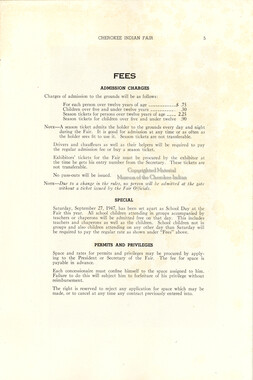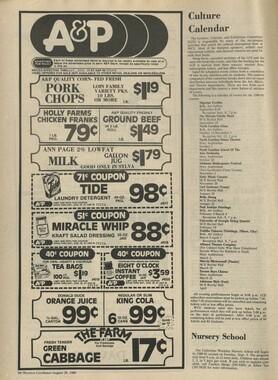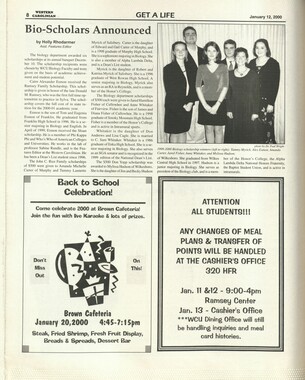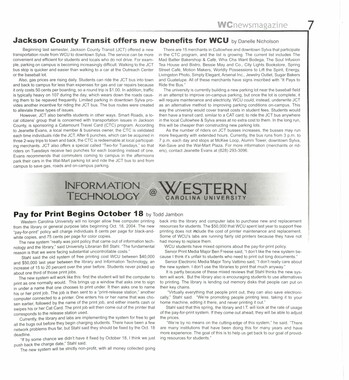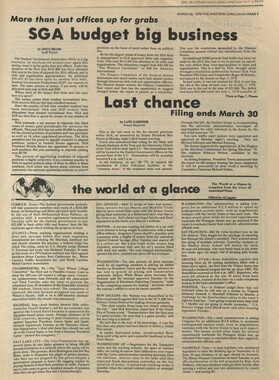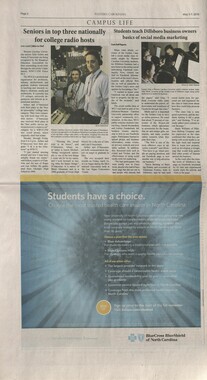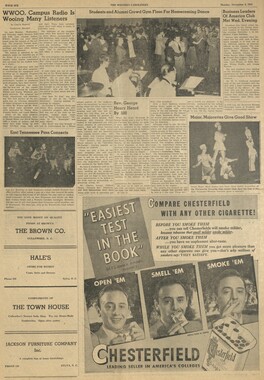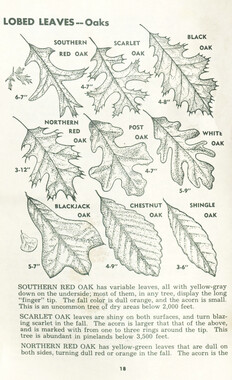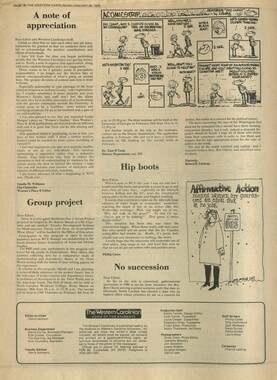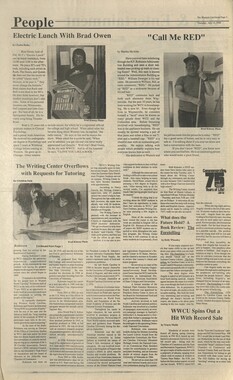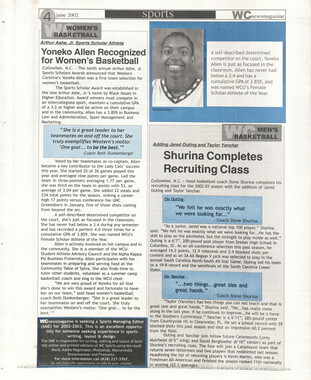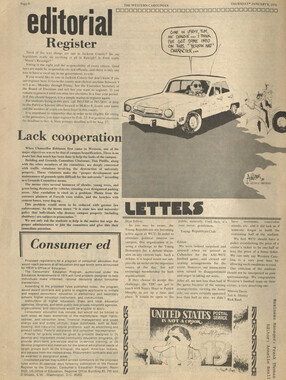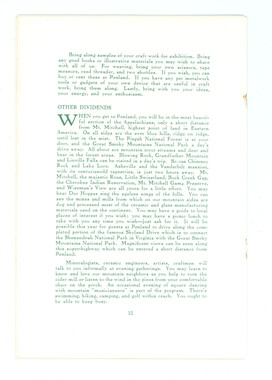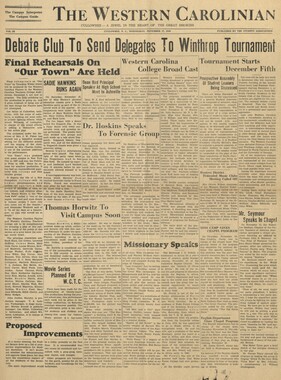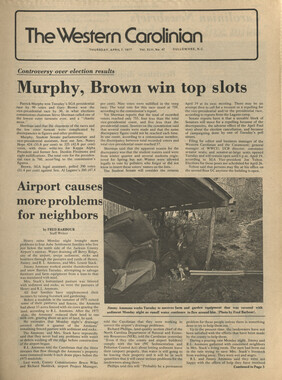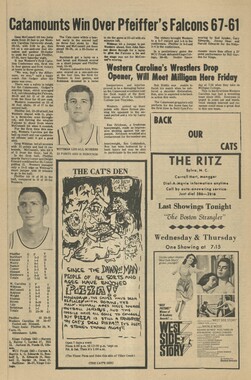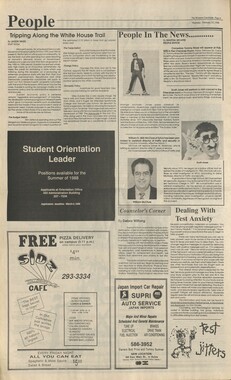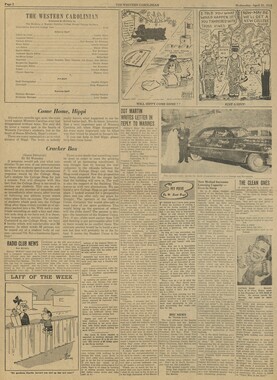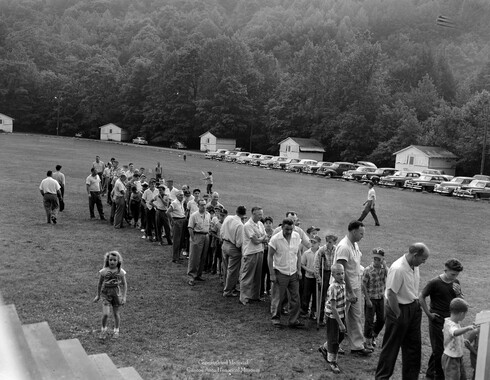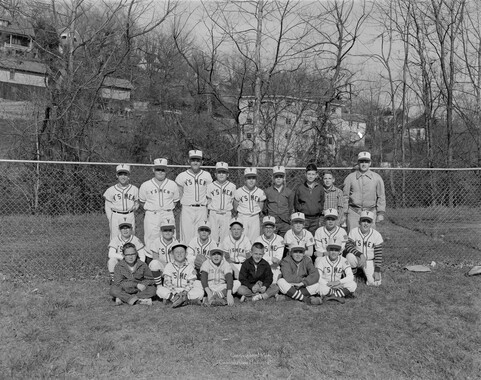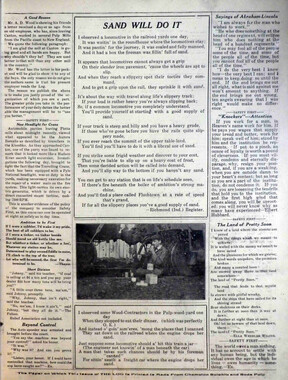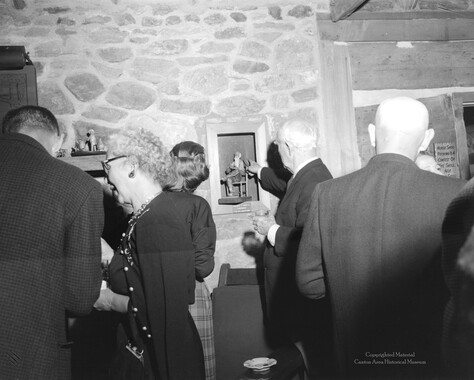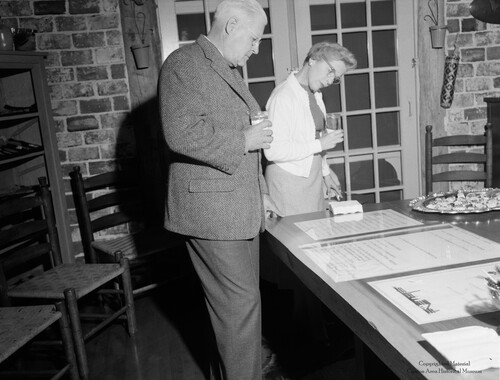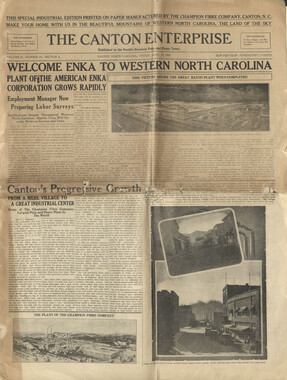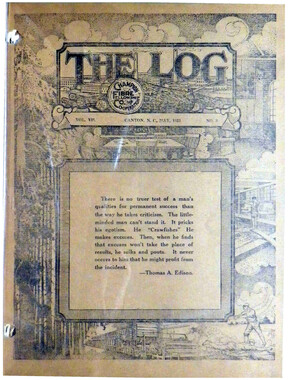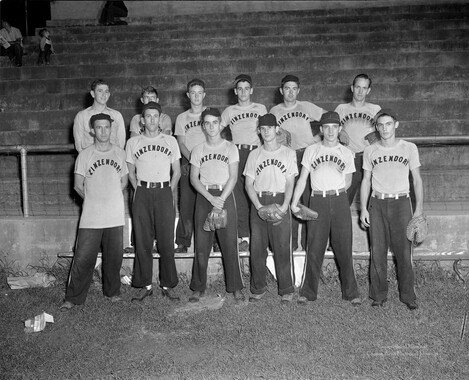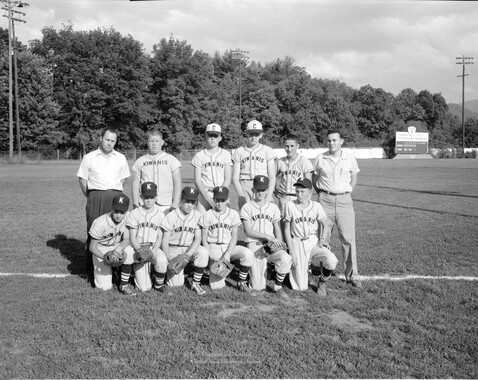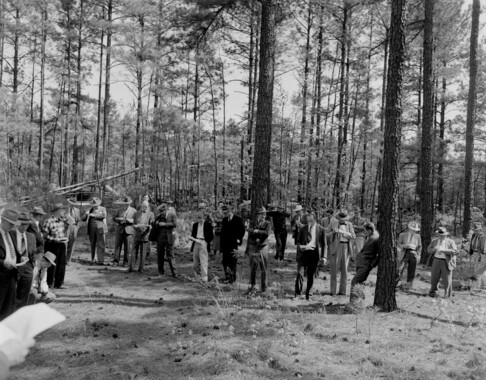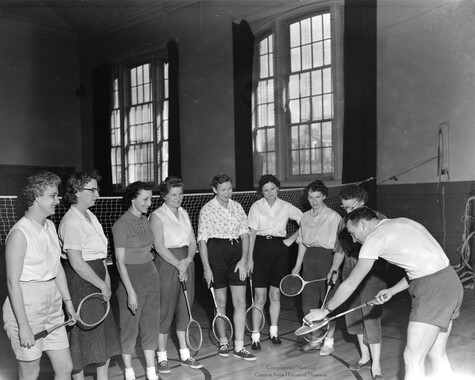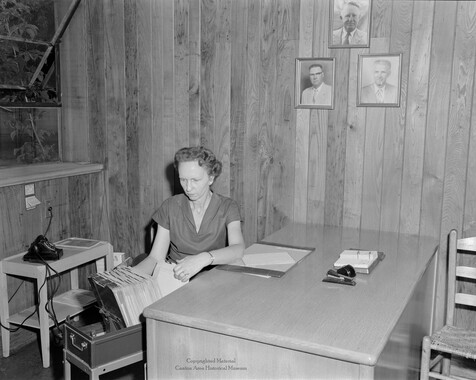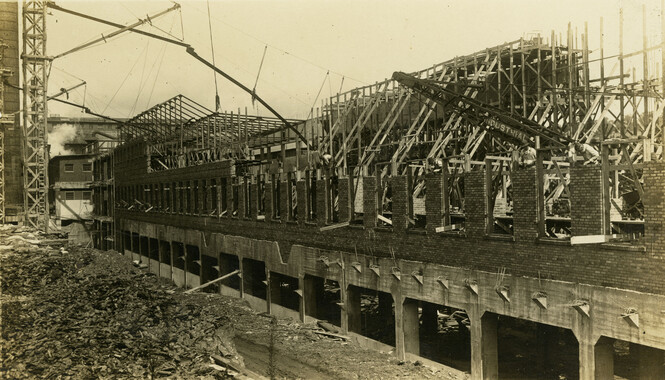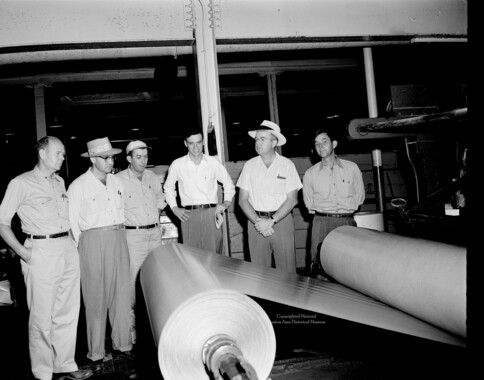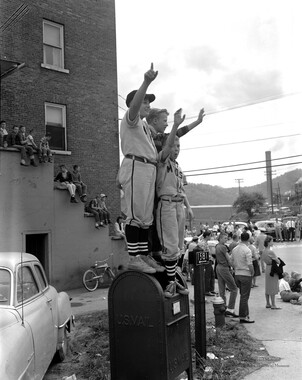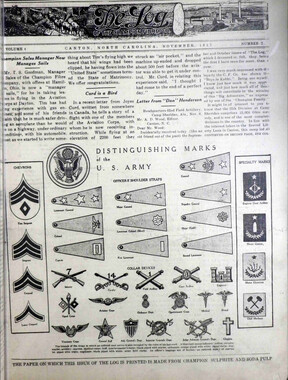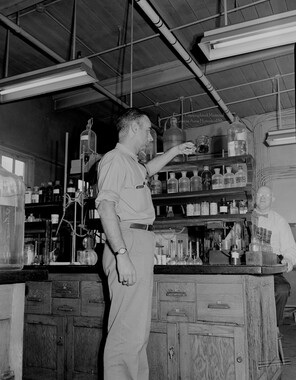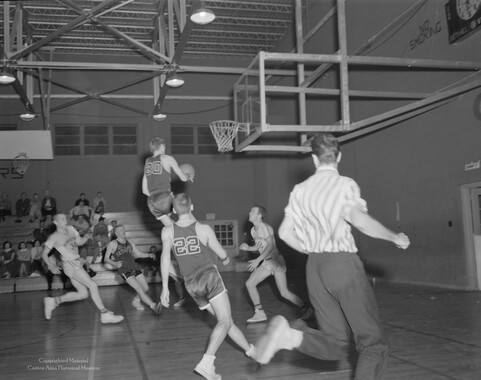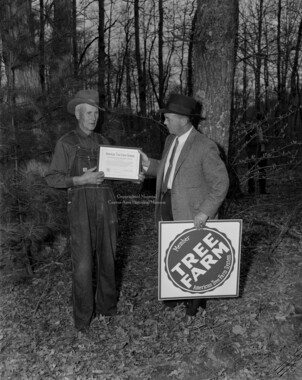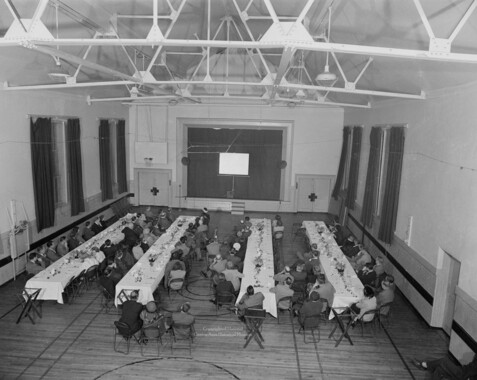Western Carolina University (20)
View all
- Canton Champion Fibre Company (2308)
- Cherokee Traditions (291)
- Civil War in Southern Appalachia (165)
- Craft Revival (1942)
- Great Smoky Mountains - A Park for America (2946)
- Highlights from Western Carolina University (430)
- Horace Kephart (941)
- Journeys Through Jackson (159)
- LGBTQIA+ Archive of Jackson County (85)
- Oral Histories of Western North Carolina (314)
- Picturing Appalachia (6873)
- Stories of Mountain Folk (413)
- Travel Western North Carolina (160)
- Western Carolina University Fine Art Museum Vitreograph Collection (129)
- Western Carolina University Herbarium (92)
- Western Carolina University: Making Memories (738)
- Western Carolina University Publications (2488)
- Western Carolina University Restricted Electronic Theses and Dissertations (146)
- Western North Carolina Regional Maps (71)
- World War II in Southern Appalachia (131)
University of North Carolina Asheville (6)
View all
- Champion Fibre Company (228)
- Champion Paper and Fibre Company (297)
- Allanstand Cottage Industries (0)
- Appalachian National Park Association (0)
- Bennett, Kelly, 1890-1974 (0)
- Berry, Walter (0)
- Brasstown Carvers (0)
- Cain, Doreyl Ammons (0)
- Carver, George Washington, 1864?-1943 (0)
- Cathey, Joseph, 1803-1874 (0)
- Cherokee Indian Fair Association (0)
- Cherokee Language Program (0)
- Crittenden, Lorraine (0)
- Crowe, Amanda (0)
- Edmonston, Thomas Benton, 1842-1907 (0)
- Ensley, A. L. (Abraham Lincoln), 1865-1948 (0)
- Fromer, Irving Rhodes, 1913-1994 (0)
- George Butz (BFS 1907) (0)
- Goodrich, Frances Louisa (0)
- Grant, George Alexander, 1891-1964 (0)
- Heard, Marian Gladys (0)
- Kephart, Calvin, 1883-1969 (0)
- Kephart, Horace, 1862-1931 (0)
- Kephart, Laura, 1862-1954 (0)
- Laney, Gideon Thomas, 1889-1976 (0)
- Masa, George, 1881-1933 (0)
- McElhinney, William Julian, 1896-1953 (0)
- Niggli, Josephina, 1910-1983 (0)
- North Carolina Park Commission (0)
- Osborne, Kezia Stradley (0)
- Owens, Samuel Robert, 1918-1995 (0)
- Penland Weavers and Potters (0)
- Rhodes, Judy (0)
- Roberts, Vivienne (0)
- Roth, Albert, 1890-1974 (0)
- Schenck, Carl Alwin, 1868-1955 (0)
- Sherrill's Photography Studio (0)
- Smith, Edward Clark (0)
- Southern Highland Handicraft Guild (0)
- Southern Highlanders, Inc. (0)
- Stalcup, Jesse Bryson (0)
- Stearns, I. K. (0)
- Thompson, James Edward, 1880-1976 (0)
- United States. Indian Arts and Crafts Board (0)
- USFS (0)
- Vance, Zebulon Baird, 1830-1894 (0)
- Weaver, Zebulon, 1872-1948 (0)
- Western Carolina College (0)
- Western Carolina Teachers College (0)
- Western Carolina University (0)
- Western Carolina University. Mountain Heritage Center (0)
- Whitman, Walt, 1819-1892 (0)
- Wilburn, Hiram Coleman, 1880-1967 (0)
- Williams, Isadora (0)
- 1890s (9)
- 1900s (110)
- 1910s (131)
- 1920s (127)
- 1930s (153)
- 1940s (187)
- 1950s (952)
- 1960s (291)
- 1970s (7)
- 1980s (1)
- 1600s (0)
- 1700s (0)
- 1800s (0)
- 1810s (0)
- 1820s (0)
- 1830s (0)
- 1840s (0)
- 1850s (0)
- 1860s (0)
- 1870s (0)
- 1880s (0)
- 1990s (0)
- 2000s (0)
- 2010s (0)
- 2020s (0)
- Appalachian Region, Southern (8)
- Asheville (N.C.) (17)
- Buncombe County (N.C.) (30)
- Cherokee County (N.C.) (10)
- Great Smoky Mountains National Park (N.C. and Tenn.) (3)
- Haywood County (N.C.) (2149)
- Henderson County (N.C.) (1)
- Jackson County (N.C.) (8)
- Macon County (N.C.) (1)
- Qualla Boundary (6)
- Swain County (N.C.) (7)
- Transylvania County (N.C.) (1)
- Waynesville (N.C.) (14)
- Avery County (N.C.) (0)
- Blount County (Tenn.) (0)
- Clay County (N.C.) (0)
- Graham County (N.C.) (0)
- Knox County (Tenn.) (0)
- Knoxville (Tenn.) (0)
- Lake Santeetlah (N.C.) (0)
- Madison County (N.C.) (0)
- McDowell County (N.C.) (0)
- Mitchell County (N.C.) (0)
- Polk County (N.C.) (0)
- Rutherford County (N.C.) (0)
- Watauga County (N.C.) (0)
- Yancey County (N.C.) (0)
- Aerial Views (5)
- Cards (information Artifacts) (2)
- Clippings (information Artifacts) (16)
- Drawings (visual Works) (1)
- Envelopes (1)
- Manuscripts (documents) (5)
- Maps (documents) (1)
- Negatives (photographs) (1514)
- Newsletters (519)
- Photographs (161)
- Portraits (14)
- Postcards (9)
- Publications (documents) (43)
- Slides (photographs) (41)
- Aerial Photographs (0)
- Albums (books) (0)
- Articles (0)
- Artifacts (object Genre) (0)
- Bibliographies (0)
- Biography (general Genre) (0)
- Copybooks (instructional Materials) (0)
- Crafts (art Genres) (0)
- Depictions (visual Works) (0)
- Design Drawings (0)
- Exhibitions (events) (0)
- Facsimiles (reproductions) (0)
- Fiction (general Genre) (0)
- Financial Records (0)
- Fliers (printed Matter) (0)
- Glass Plate Negatives (0)
- Guidebooks (0)
- Internegatives (0)
- Interviews (0)
- Land Surveys (0)
- Letters (correspondence) (0)
- Memorandums (0)
- Minutes (administrative Records) (0)
- Newspapers (0)
- Notebooks (0)
- Occupation Currency (0)
- Paintings (visual Works) (0)
- Pen And Ink Drawings (0)
- Periodicals (0)
- Personal Narratives (0)
- Plans (maps) (0)
- Poetry (0)
- Programs (documents) (0)
- Questionnaires (0)
- Relief Prints (0)
- Sayings (literary Genre) (0)
- Scrapbooks (0)
- Sheet Music (0)
- Songs (musical Compositions) (0)
- Sound Recordings (0)
- Specimens (0)
- Speeches (documents) (0)
- Text Messages (0)
- Tintypes (photographs) (0)
- Transcripts (0)
- Video Recordings (physical Artifacts) (0)
- Canton Area Historical Museum (2110)
- Hazel Scarborough Collection (1)
- Norburn - Robertson - Thomson Families Collection (22)
- A.L. Ensley Collection (0)
- Appalachian Industrial School Records (0)
- Appalachian National Park Association Records (0)
- Axley-Meroney Collection (0)
- Bayard Wootten Photograph Collection (0)
- Bethel Rural Community Organization Collection (0)
- Blumer Collection (0)
- C.W. Slagle Collection (0)
- Carlos C. Campbell Collection (0)
- Cataloochee History Project (0)
- Cherokee Studies Collection (0)
- Daisy Dame Photograph Album (0)
- Daniel Boone VI Collection (0)
- Doris Ulmann Photograph Collection (0)
- Elizabeth H. Lasley Collection (0)
- Elizabeth Woolworth Szold Fleharty Collection (0)
- Frank Fry Collection (0)
- George Masa Collection (0)
- Gideon Laney Collection (0)
- Hiram C. Wilburn Papers (0)
- Historic Photographs Collection (0)
- Horace Kephart Collection (0)
- Humbard Collection (0)
- Hunter and Weaver Families Collection (0)
- I. D. Blumenthal Collection (0)
- Isadora Williams Collection (0)
- Jesse Bryson Stalcup Collection (0)
- Jim Thompson Collection (0)
- John B. Battle Collection (0)
- John C. Campbell Folk School Records (0)
- John Parris Collection (0)
- Judaculla Rock project (0)
- Kelly Bennett Collection (0)
- Love Family Papers (0)
- Major Wiley Parris Civil War Letters (0)
- Map Collection (0)
- McFee-Misemer Civil War Letters (0)
- Mountain Heritage Center Collection (0)
- Pauline Hood Collection (0)
- Pre-Guild Collection (0)
- Qualla Arts and Crafts Mutual Collection (0)
- R.A. Romanes Collection (0)
- Rosser H. Taylor Collection (0)
- Samuel Robert Owens Collection (0)
- Sara Madison Collection (0)
- Sherrill Studio Photo Collection (0)
- Smoky Mountains Hiking Club Collection (0)
- Stories of Mountain Folk - Radio Programs (0)
- The Reporter, Western Carolina University (0)
- Venoy and Elizabeth Reed Collection (0)
- WCU Gender and Sexuality Oral History Project (0)
- WCU Mountain Heritage Center Oral Histories (0)
- WCU Oral History Collection - Mountain People, Mountain Lives (0)
- WCU Students Newspapers Collection (0)
- Western North Carolina Tomorrow Black Oral History Project (0)
- William Williams Stringfield Collection (0)
- Zebulon Weaver Collection (0)
- African Americans (2)
- Artisans (1)
- Cherokee women (2)
- Church buildings (33)
- Dams (5)
- Dance (23)
- Education (115)
- Floods (6)
- Forest conservation (200)
- Forests and forestry (46)
- Great Smoky Mountains National Park (N.C. and Tenn.) (6)
- Hunting (6)
- Logging (9)
- Paper industry (32)
- Postcards (6)
- Railroad trains (14)
- Sports (429)
- Wood-carving -- Appalachian Region, Southern (1)
- World War, 1939-1945 (42)
- Appalachian Trail (0)
- Cherokee art (0)
- Cherokee artists -- North Carolina (0)
- Cherokee language (0)
- Cherokee pottery (0)
- Civilian Conservation Corps (U.S.) (0)
- College student newspapers and periodicals (0)
- Folk music (0)
- Forced removal, 1813-1903 (0)
- Gender nonconformity (0)
- Landscape photography (0)
- Maps (0)
- Mines and mineral resources (0)
- North Carolina -- Maps (0)
- Pottery (0)
- Rural electrification -- North Carolina, Western (0)
- School integration -- Southern States (0)
- Segregation -- North Carolina, Western (0)
- Slavery (0)
- Storytelling (0)
- Waterfalls -- Great Smoky Mountains (N.C. and Tenn.) (0)
- Weaving -- Appalachian Region, Southern (0)
- StillImage (1725)
- Text (584)
- MovingImage (0)
- Sound (0)
The Canton Enterprise Volume 41 Number 38
Item
Item’s are ‘child’ level descriptions to ‘parent’ objects, (e.g. one page of a whole book).
-
-
PAGE TWO The Canton Enterprise PUBLISHED EVERY THURSDAY ] ST4 Main Street Phone 2382 Canton. N. C. | HARLEY E. WRIGHT, Owner-Publisher MISS LURA WRIGHT, Editor TERMS OF SUBSCRIPTION One Year $2.00 Six Months $1.00 All Subscriptions Payable in Advance Entered as second class matter May 3 1911 at the post office at Canton, N. C„ under act of March 3, 1879. »iti Carolina i MISS AlStiClAIlU j/tla '°'m1c$™ Address ^ Communications *)r to The Canton Enterprise —AT EAST Peace has come to the world at last. For usf few years most of the earth has been the scene of devastation and destruction on an unprecedented scale. The God of War has reigned supreme. Many lands have trembled under the marching feet of legions panopled for battle, the skies have been filled with flying ships dropping destruction upon countless millions, and the seven seas have claimed their toll of lives as mighty ships fought duels unto death. The rivers of the world have run red with the blood of young and stalwart men as Wars has held sway. But with the capitulation fjf Japan the ■ slaughter has ceased, and unfettered joy has swept around the world. It has been, and still is, a time for thanksgiving that this last aggressor nation has bowed to the inevitable and quit its campaign of conquest. It is a bitter pill for the boastful Nipponese, the little men who thought in their vanity that they would conquer the world, and that they would dictate terms to the United States from the White House. Instead the terms were dictated to them, and now General Douglas MacArthur is giving orders to the Emperor who rides the famous white horse. The Son of Heaven has become a mere rubber stamp for an American general. But, happy as the world may be over the last fallen foe, the problems of peace are complex and exceedingly difficult. The transition to the ways of peace will tax the ingenuity of our statesmen and industrialists, and the problems before us now are suf- iciently great to sober us for the tasks which lie ahead. The people of Canton and Haywood County have paid their part in the struggle, having left many fine young men to sleep forever on foreign soil. It is up to us now to make their sacrifice worth while by doing our best to preserve the principles for which they fought. ABREAST OF THE TIMES Just about the time the general public comes to the conclusion that the good old days are gone forever, that high costs will prevent expansion, and that it will be necessary for a benevolent government to look after all its unemployed citizens, industry^ comes along wiU> some new and helpful plans whi< I the 'pessimist's applecart. As fevfdence.of this, the possibility of a postwar building boom has stimulated interest in improved building codes throughout the country, according to a report just isued by the National Board of Fire Underwriters. "While the public has feared the cost of building will be so high after the war that the average man cannot hope to own a home, the National Board cites that predictions are widely made that postwar houses embodying materials now generally unknown, will be fabricated in greater quantities in factories so that they can be quickly asembled on the building site. Unbelievably low costs to purchasers are talked about. "The Chamber of Commerce of the United States is on record advising cities to restudy their building codes. It is hoped that provision may be made to take advantage of technological advances resulting from the war effort and the availability of new building materials which are in the process of development. Lower building costs with the same promise of safety are in prospect." ALCOHOL AND CRIME The Supreme Court of the United States said in the Crawley vs. Christian decision, "Most of the crime in every state is caused by the retail sale of intoxicating liquors." Chief Justice Coleridge, of the English court, said, "Nine-tenths of the criminals who come before the bar are made so by the saloons." We have in the United States, according to J. Edgar Hoover, four million five hundred thousand criminals. A crime is being committed every twenty-two seconds, costing our country fifteen billion dollars annually. And yet, in the face of these facts, the distillers are given a month in which to make fifty million gallons of liquor, using seven million bushels of grain, enough grain to feed the people of Greece. What can we expect from such procedure as this?—The Rutherfordton News. WASHINGTON By CHARLES P. STEWART j Central Press Columnist ' VANDENBURG DISPELLING GOP OPPOSITION TO U N. CHARTER SCHWELLENBACH AVOIDS TIFF OVER PROPOSED LABOR ACT WASHINGTON — Diplomatic observers credit Senator Arthur Vandenberg (R) Mich., with dissipating much of the potential Republican opposition to the United Nations charter. When the late President Roosevelt asked Vandenberg to be a delegate to San Francisco, many felt that the chief executive had put over another masterful political coup. The Michigan Republican's activity in charting the U. S. course belied this. With former Gov. Harold E. Stassen, Minnesota Republican, Vandenberg showed that the nation's international role should be on a bi-partisan basis. When Vandenberg returned to Washington, he reiterated forcefully his support of the charter. Some thought his speech overshadowed the appeal made by Senator Thomas Connally (D) Texas, foreign relations committee chairman. Observers also noted that Vandenbdrg's plea before the Detroit Economic club also stamped him as a determined, ardent supporter of American participation in post-war international affairs. The two speeches not only stated unequivocally Vandenberg's reasons for adherence; they anticipated opposition arguments and knocked them down. # * # * Labor Secretary Lewis Schwellenbach is steering clear of the controversy provoked by the proposed new Federal Industrial Labor Relations act, introduced by Senators Joseph Ball (R) Minn.; Harold Burton (R) Ohio, and Carl Hatch (D) N. M. The cabinet member says he is not even going to read the bill until he completes reorganization of his department. Sen. Lister Hill (D) Ala., other member of the B2H2 combination that sponsored the resolution urging U. S. participation in world cooperation for peace, was requested by his three colleagues to jxoin in sponsoring the labor legislation but refused. Hill received strong support from labor in his reelection fight and apparently does not want to antagonize his backers. Sen. James Fulbright (D), Ark., also was asked to put his name on the labor bill but declined. A storm of opposition to the measure has arisen in labor ranks. Many high-ranking desk-bound officers in the navy department and at Pacific fleet headquarters on Guam figuratively are biting their nails about how to get to sea before the Jap watt ends. There were plenty of disappointments among those not on the list when 29, admirals were shifted recently. Few civilians understand how important it is for regular navy officers to get commands afloat. It might be the difference between low and high rank after the war, because selection boards giv,e preference to those with sea records. That's tough on the men who are considered indispensible in planning posts ashore. There are several such men on the staffs of Fleet Adms. Chester W. Nihitz and Ernest J. King. One such admiral who finally got a break —and deserved it—was Vice Adm. John Towers, the navy's No. 1 airman, who had administrative jobs in Washington and the Pacific but soon will take over the Second Fast Task force from Vice-Adm. John S. McCain. Because of the unprecedented wartime expansion of the navy, there will be plenty of postwar competition for top billets when the fleet and other activities are cut down to peacetime needs. * * * # The Duke of Windsor, former king of England, has a yen for American-made pipes. Asked if he has other smokers' troubles about getting good English pipes during the war, the duke launched into a discussion of American pipes, labeling some of them excellent. He particularly likes some made in a small shop in New York City. Reminded that several well-known English firms might be disturbed by his endorsement of American pipes, the duke laughed and conceded: "That might be right!" Tires that may wear as long as the automobile are under development, says Firestone, Akron, Ohio, which expects to produce one "that will run 100,000 miles." Puncture- proof and nonskid developments will be explored in a new $2,000,000 laboratory. Grandpappy Jenkins says an old-timer is a fellow who can remember wflen the banquet table was known as the "groaning board." News from Berlin says the housewives of the busted German capital are busily removing the debris and rubble. This is a different kind of clean-up than that which was visualized by their Nazi husbands. A reader wants to know if the fact that President Truman is the best piano player among the Big Three shouldn't make him the conference's key man, THURSDAY, AUGUST 16, 1945 YOU'RE TELLING ME By WILLIAM RITT fff By NEWMAN CAMPBELL *f Jacob Realizes The Presence of God PARENT PROBLEMS By Garry Cleveland Myers, Ph.D. Summer Check-Up In Health (The International Uniform lesson on the above topic for August 19 is Genesis 27, 28, the Memory Verse being Gen. 28:15, "Behold, I am with thee, and will keep thee whithersoever thou goest.") Isaac is art old man when today's lesson begins. His eyesight is poor, so that he cannot tell one person from another. He lived many years after the episodes related here took place, but he thought his life was nearly ended. His sons were twins, you remember, Esau being born first, and he was his father's favorite; Jacob was Rebekah's. This was a very bad thing and caused trouble, as we shall see. Isaac called Esau to him, and told him to go forth, kill venison, prepare it as Isaac liked it prepared, and bring some to him. Now Rebekah overheard Isaac's instructions and, as soon as Esau had gone, she called Jacob to her and toid him to kill a kid and bring it to her that she might cook it as Isaac liked. Then he was to go to his father with the food and get the blessing in Esau's place. To Jacob's credit be it said that he did not favor his mother's scheme .at first, but when sbje ex-, plainedlthat she would disguise him so his father would think he was Esau, the temptation pr«v<pi too great and he did as she said. Isaac Is Deceived With the savory food in his hands, with the rough hairy skin of tlie kid covering his arms and the back of his neck, Jacob went to his father. Isaac recognized Jacob's voice, but when Jacob insisted he was Esau, and when he felt his arms, he thought it sure* was Esau. He, however, asked how Esau had prepared the meat so- quickly, and Jacob, once launched upon a lie, said (blasphemously, it seems to us), "Because the Lord thy God brought it to me." Jacob was convinced, bestowed his bless-* ing, and kissed him. When Esau returned and real-' ized what deception had been used to steal his blessing, he was grief' stricken, saying, "Hast thou but one blessing, my father? bless me, even me also, O my father," and he wept, Esau was given a bless ing, but he was told that he, the older brother, should serve Jacob and should live by the sword. Naturally, being cheated twice by Jacob, Esau hated his brother and swore that when their father died he would kill him. Rebekah, learning this, thought it best to send Jacob away for a short time to visit her people, giving as excuse for his absence that his parents did not want him to marry a Canaanite woman but that he should choose a wife from among her relatives at Haran. Isaac- agreed to this. Jacob started alone on his journey, and one night, being very weary, he put a stone under his head for a pillow and laid down to sleep. In his sleep he dreamed that he saw a ladder leading from earth to heaven upon which angels were descending and ascending'. "And behold the Lord stood upon it," proclaiming Himself as the God of Abraham and Isaac, and saying that the land where Jacob lay should be his and his seed's after him. God With Him "And behold, I am with thee, and will keep thee in all places whither thou goest, and will bring thet'e again/ into this land,'^ „£aid the" Lord. \ t When Jacob awoke he said, "Surely the Lord is in this place; and I knew it not." He was frightened, and said, "How dreadful is this place! this is none other than the house of God, and this i.s the gate of heaven." He rose early in the morning, took the stone he had used for a pillow, set it up for a pillar, and poured oil on the top of it. He called the name of the place Bethel, and vowed that if God would be with him and "will keep me in this way that I go, and will give me bread to eat., and raiment to put on. "So that I come fcgain to my lather's house in peace, then shall the Lord be my God." He promised that of all that should be given him one-tenth would he give to the Lord. Thus Jacob realized at last the presence of God of his lathers, and he went on his way, probably comforted. By Garry Cleveland Myers, Ph.D local PTA has, as a part of the fine program of the National Congress of Parents and ers, conducted in many communities throughout the nation, each spring, a summer round-up im. Thereby it induces most ■ parents of the children who will enter the first grade in September to bring these children to school on a certain date where the school nurse anil school doctor (be there one), or volunteer doctors and dentists, join in physical examination of these children. Pronounced physical detects, such as decayed teeth, impaired vision, adenoids and diseased ton- ils are observed and the parents advised to have such corrected during the summer by the family loctor and dentist. Wise parents follow this advice in order to make sure the child, on entering school in September, is not handicapped by remediable physical defects. Medical Checkup Parents whose local community has not had such a program should have their children who will enter the first garde next September checked by their own doctor and dentist. Most parents of older children, too, even of high school age, would do well to have right away a physical check of these youngsters so that such remediable corrections as are necessary may be made long before school reopens in the fall. Discerning parents of the child who will enter the first grade in September should consider now his social, emotional and mental preparation. He may not have learned to play normally with other children of his age, so very necessary for success at school. Let his parents spend time and effort at socializing him. The youngster needs to be with other children near his age. If no such playmates are in the block, some children farther away may, with the approval of their parents, be attracted to your home, or you might go with him a few times a week to their homes. Sunday School Attendance at Sunday school and vacation church school also offers large possibilities. Too, several parents might contrive to cooperate in a play school for their Peter Lawford, Donald Crisp, Lassie and Laddie, appearing in the picture "SON OF LASSIE", next week, Tuesday and Wednesday, at the Colonial. The Everyday Counsellor By REV. HERBERT SPAIJGH, D. D. SmiHclUORLD orRCLIG BV UJ.UI.RCID The U. S. army's "This Is the Army" show has earned $10,000,000 profit for the service's relief fund. That other show—the one Uncle Sam is putting on in the air above Japan- is an even bigger knockout. ! ! ! Canned sandwiches are a post-war promise. However, the picnic ant, no doubt, will develop the ability to bore through tin. ! ! ! The Jap octopus, according to some reports, is trying to reconvert its tentacles of conquest into peace feelers. ! ! ! News that barrage ballons are now for sale to civilians gives Zadok Dumkopf an idea how a fellow, despite the transportation tie-up, might spend his two-week's vacation. ! ! ! The slogan, "Food Is a Weapon," rings true to Grandpappy Jenkins who says the relative who owns a beefsteak certainly controls the situation. One who has worked for the welfare ol* prisoners of war "on both sides of the barbed wire lences", Dr. Tracy Strong, of the war prisoner's aid ot the World Y.M.C.A., said recently: "There are 2,100,000 Germans still prisoners of war of the Americans. We can do more to reconstruct the future of Germany during the next 12 months in the prisoner- of-war camps than in Germany itself. Our own POW's as they return don't want to be put in the pulpit or ptess. They want to 'unload' and take their time doing it—telling you all about it. More than almost any returning serviceman he understands the spiritual implications of the war." In some thousands of Protestant churches in every state of the union, laymen will "occupy the pulpits" and conduct religious services on Sunday, October 21. This is annual "Laymen's Sunday," sponsored by the laymen's movement for a Christian world (347 Madison Ave., New York 17, N. Y.) and designed to be an oc- 1 "when the men of the church report to the pastor and the congregation the successes and failures they are having in applying the principles they haw taught by their pastor." "The Golden Rule"—applied to work in the home, in business, in the nation, and in the world—will be I the subject of the day's sermons. According to Bishop Herbert Welch, chairman of the Methodist committee for overseas relief, reports reaching him as to the need of various countries in Europe for food and other supplies, indicate varied conditions / and requirements from country to country. The situation in Frjp.ce, he learns, is no longer critical, but problems of black market ancj transportation remain; the industrious Belgians are not in danger of starvation; the people of Denmark despite the terrors of Nazi occupation, are well-fed, and supplying food to nearby countries; conditions in Finland arc critical, and assistance will be needed up until harvest and perhaps- even longer; while throughout the Balkans continued relict shipments are' needed to stave off semi-starvation. In these days when religious toleration is much under discussion, Wing Tabor Wetmore, president of the Minute Men of America, and other leaders of patriotic and religious bodies are recalling expressions from a sermon delivered by President George Washington before the Hebrew congregation of Newport, R. I., a century and. a half ago. In it the Father of his Country said: "Happily, the government of the United States which gives to bigotry no sanction, to persecution no assistance, requires only that they who live under its protection should demean themselves as good citizens, in giving it on all occasions their effectual support. May the children of the stock of Abraham, who dwell in this land, continue to merit and enjoy the goodwill of the other inhabitants; while everyone shall sit safely under his own vine and fig-tree, and there shall be none to make him afraid." You may think you can beat your conscience, but you can't! Silly people still fool themselves with the idea that their conduit is their personal business. They think they can ignore the laws of God, flout the laws of men and get away with it. Their number is increasing. There are those who say that you can club your conscience into insensibility; that by continually disregarding .its warnings you won't hear it. If anyone living can prove that theory, certainly Germany's war leaders ought to be able to do so. After plunging the world into the holocaust of war, committing thousands of innocent victims to torture, sadism, brutality and death, they certainly ought to be hardened to it. But what is the evidence? The headlines read, "Captured German Leaders Cracking Up , As They Await Trial For War Crimes". Long ago Shakespeare wrote, "Conscious doth make cowards of us all". Nazidom's .supposed "iron men" are "breaking morally and physically". Swashbuckling Hermann Goer- ing who directed the London blitz and the ruthless and unprovoked bombing of Rotterdam, is in abject fear of death. He recently had a could I 1, but didn't. Dr. Hans Frank, Nazi over lord of the Polish brutality, shifts between hysteria and scorn, constantly cryirig out in his anguish, "I am a criminal!" Dr. Robert Ley, union chieftain and over lord. of Nazi workmen, is "disintegrating physically and morally, has only one friend among the dozens of top, Nazis here (Mondorf in Luxembourg)— Julius Streicher, Hitler's No. 1 Jew baiter. Streicher himself now has changed and claims that there are "good Jews" and the Jews shduld be allowed to live unmolested. Sgt. Robert Bock of Milwaukee, assistant in the liaison office of the prison says, "They are scared to death. They distrust each other. They try to pass the buck and they go into hysterics at the slightest thing." Almighty God planted deep within every man a divine spark when he created him "in his own image"; That spark is almost impossible to extinguish. It keeps alive conscience which even {though buried, rebels against vb to God and decency. If these Nazi "iron men" haven't learned how to beat conscience, what makes you think you can? The secret of peace in the heart ice with God. For list of recommended books pecial article.-; dealing with lal problems, write Dr. Spaugh in can ol the newspaper heart attack as a result of a thun- in which you read this, enclosing derstorm. A vial of poison was I a long self-addressed stamped found among his effects which he envelope, stating your problem. THE OLD HOME TOWN >~^,w, Bv STANLEY ANP LISTEN,l>OTTie,ir ANYTHING SOeS WRONG YOufeE AlOT SUPPOSED/ TO TAKE THIS MACHINE APART.' children during the summer. The more the tot plays with other children the less, as a rule, is he tied to his mother emotionally. (You know the problems of the child entering school who cries after his mother.) Also the more he can . look after himself and amuse himself, the b'etter he will be prepared for school. All suggestions about school should picture it as hopefully attractive to the child. An adult or an older child should read daily to this tot. No better way to cultivate in him good habits of concentration and readiness to "listen" profitably at school. At play, this child might also profit from gaining acquaintance with a few letters of the alphabet, though he should not learn them in order until a lew- years later. In many a school -nine familiarity with numbers up to ten might be helpful. Sin many schools children in the first draw and color, the tot should have experience before school at such creative fun. Moreover, this child needs to have learned respect for the rights and ions of others and due regard for constituted authority, before he enters school. About 9 million farm workers produce cotton; 75,000 employees : 18,000 crush its seed; 16,000 louse and compress it; and 7,000 market it. There is no scientific evidence to back up the superstition that thunder or lightning causes milk or ere im to : our. A custard sauce, served at room temperature, tastes sweeter than ime sauce made into frozen custard. The Protestant churches of the United States will be spending more money on new churches and improvements in the first five years after the war than they have spent in previous twenty, according to Dr. John R. Scotford, one of the founders of the Christian arts guild, operating under the Congregational-Christian churches and attempting to guide church building committees in erecting more beautiful and more useful sanctuaries. "It wdll be the biggest building era the churches have ever had." says Dr. Scotford. "One of the difficulties will be that most of the experienced church an hitects have either died or retired. The Arts Guild hopes to help many churches in meeting the problems of inexperienced architects." "Rural life in all its phases must play an important part in the solution of this social war," say Bishop Joseph H. Schlarman, ol Peoria, 111., president of the National Catholic Rural Life conference. "It is estimated thai some fifty million people in this country are today employed either in the armed services or as war workers. The rural life offers a solution to the unemployment that may result from this situation after the war. It is evident that these millions cannot find employment in industry and in the city. Large numbers must be channeled off to the rural areas. We must fight for the family type farm and family-owned farms as against corporation farming, if we are not to find ourselves in the same difficulties as countries with a few large and immensely wealthy landowners. Capitalist corporation farmers are parasites that fatten on the land." IS/'You bet I always do as Mora tells me—so does Pop !?j£^
Object
Object’s are ‘parent’ level descriptions to ‘children’ items, (e.g. a book with pages).
-
The Canton Enterprise (19??–1971) was published in Canton, North Carolina by the Canton Publishing Company. Its preceding title was The Canton Observer (circa 1900-), and succeeding title was The Enterprise (1971-1996).
-
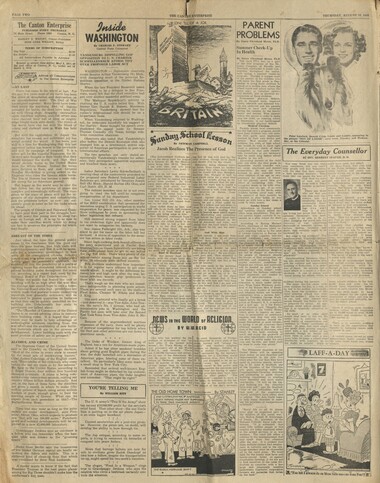



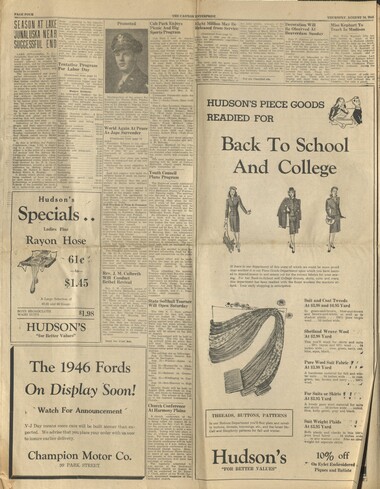
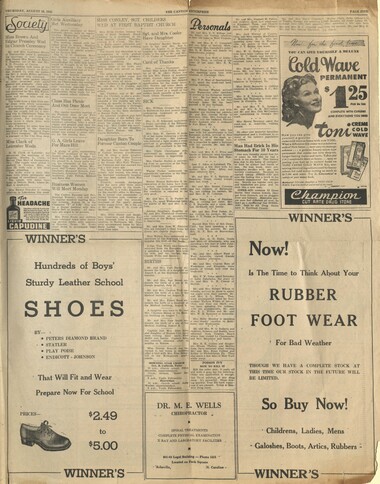
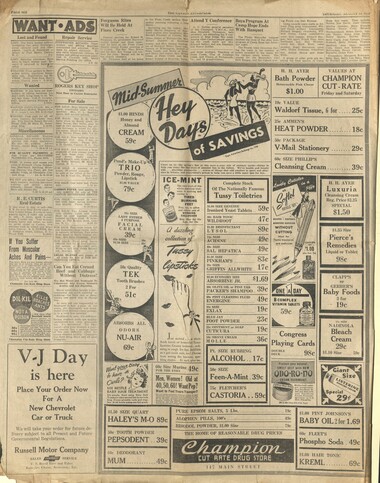
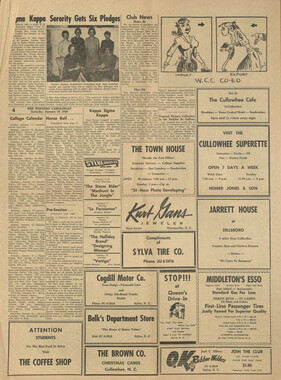
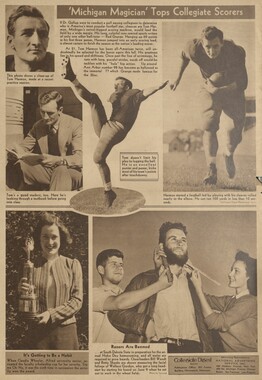
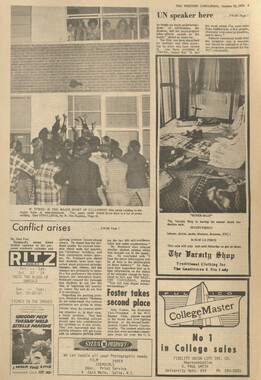
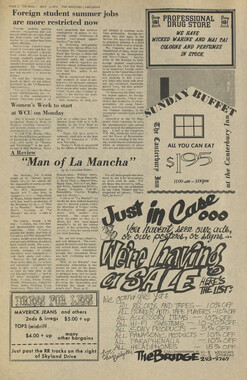
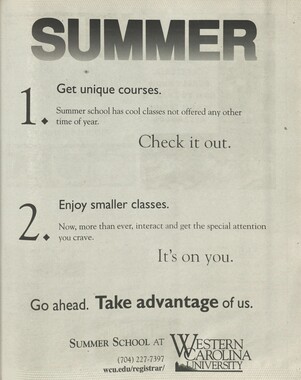
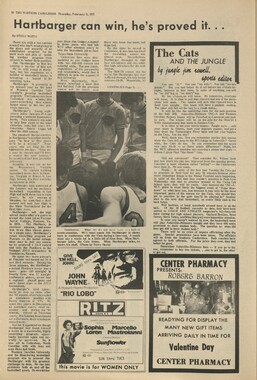
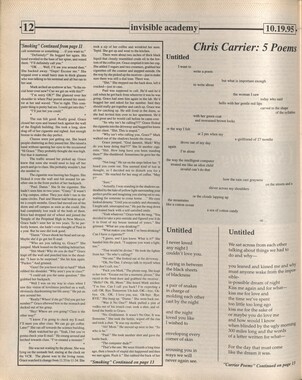
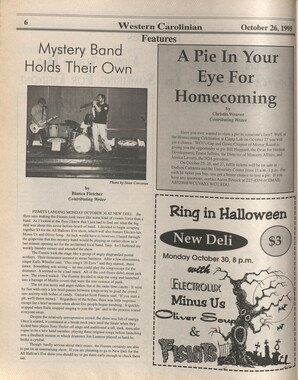
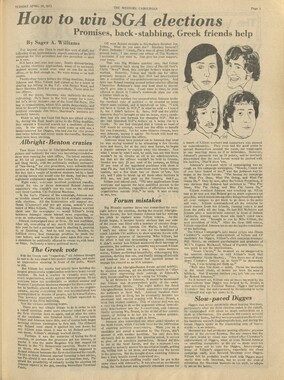

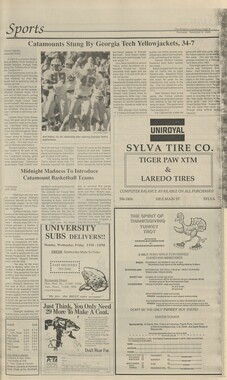
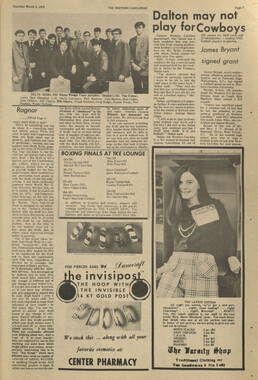
![hl_westerncarolinian_2008-09-26[10-27]_vol74_no03[04]_08.jpg](/media/w400h300/wcu_publications/hl_westerncarolinian_2008-09-26[10-27]_vol74_no03[04]_08.jpg)
